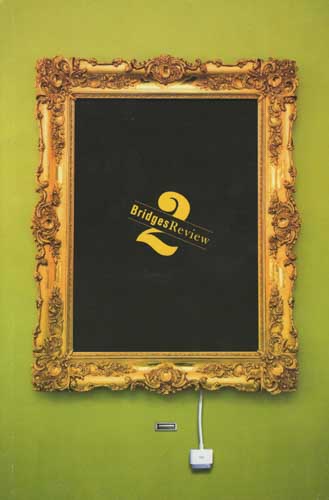2 Bridges Review – 2013
2 Bridges Review is a young journal that consistently shows a lot of promise; it is apparent that the staff works hard to find the best work from both new and established poets. This issue puts forth poetry, fiction, nonfiction, art, and photography where “the real and the imagination fuse.” 2 Bridges Review is a young journal that consistently shows a lot of promise; it is apparent that the staff works hard to find the best work from both new and established poets. This issue puts forth poetry, fiction, nonfiction, art, and photography where “the real and the imagination fuse.”
J.R. Solonche’s solidly constructed and well-crafted poem “Brooklyn Bridge” touches on the idea that your imagination and perception can deceive you, beginning, “How much smaller it looks in stone / and steel than in its photographs.” Solonche uses the deictic it as a means of elegizing not only the Brooklyn Bridge but also an image or idea. Solonche also uses this tool to help the reader recognize that it isn’t disappointment that occurs in a moment when your imagination is wrong, but rather sadness, as he continues by comparing it to old cemeteries, “It is like the old cemeteries cities let lie. / Like the ones they fence off, and surround.”
Zeke Jarvis’s “The Posted Limit” is a fictional work about a man who gets pulled over for speeding on the return journey of spending “the perfect day” with his terminally ill son. The father tries to avoid reality by imagining his son is not sick, but, ultimately, it is impossible to completely avoid reality. Jarvis presents this to the reader by making stark contrasts in what is and what should be. As the cop approaches the car,
The father looks at his son in the rearview mirror. The son is thirteen years old. He should be starting to scream at his father, telling him that he doesn’t get it. Telling his friends that his father is lame. Instead, they’re too often silent together, having too much weight to discuss and too little of levity to laugh about.
As the story continues, the father is prepared to do what it takes to hide his son’s illness because he doesn’t want the cop to pity him. But it can’t be hidden, and the officer utters, “You have cancer?” Here Jarvis slaps the reader with the reality that everyone had been trying to avoid. This is a well-written story, definitely worth a read.
Nonfiction “The Frozen Sea” by Patricia Horvath looks at how imagination changes reality, and in some ways how reality is always changing. Horvath discusses her childhood illness and how it was the cause of the lack of a relationship she had with her father: “the wall that had formed between us all those months he was too busy to visit, months I could visit no one.” But it is her imagination that allows her to think this was the cause; in reality it is her gender. In Horvath’s journey, her reality is constantly being changed. It is a wonderful examination of how it is necessary to live through these changes and let your imagination make sense of things, but when you find the truth, it won’t be something you created, but rather something that presents itself to you.
This volume of 2 Bridges Review has been finely crafted to bring the reader a cohesive body of work from some great writers; there is something in it for everyone.





